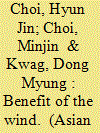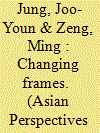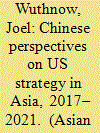|
|
|
Sort Order |
|
|
|
Items / Page
|
|
|
|
|
|
|
| Srl | Item |
| 1 |
ID:
186805


|
|
|
|
|
| Summary/Abstract |
The "rally-'round-the-flag effect" sparked by North Korea (the so-called 'Northern Wind') has been an important part of South Korean domestic politics. Despite the long history and controversy associated with politics of Northern Wind, the literature provides surprisingly little quantitative evidence on this phenomenon. In this study, we empirically investigate the relationship between North Korean-induced incidents and former President Park Geun-hye's weekly job approval ratings. Using vector autoregressions, we find that (1) President Park gained political benefits from North Korea, where negative events (e.g., armed attacks) generated a larger boost in approval than positive events (e.g., high-level talks); (2) rally effects varied across regions according to different perceptions of the North Korean regime: during security crisis, Park received the largest rallies in Gyeongnam province where the dominant image of North Korea was an 'enemy that threatens our safety'; and (3) a test of nuclear weapons or intercontinental ballistic missiles (ICBMs) did not affect approval ratings even though it captured widespread media attention.
|
|
|
|
|
|
|
|
|
|
|
|
|
|
|
|
| 2 |
ID:
186801


|
|
|
|
|
| Summary/Abstract |
In the People's Republic of China (PRC), the Chinese Communist Party (CCP) has remained stable despite frequent popular protests. Focusing on environmental protests, we attempt to explain how the CCP has utilized domestic news media to deal with protests and ensure regime stability. We chose five major protests against Para-Xylene (PX) and analyzed all of the People's Daily Online (PDO) articles thereon since 2007. From the Hu Jintao to Xi Jinping governments, PDO's collective portrayal of the anti-PX protests has dramatically changed from a symbol of democratic progress to an impediment to national industrialization and social stability. The systematically orchestrated media framing demonstrates that, instead of indiscriminately suppressing information on protests, the party has deliberately chosen when and what to permit and what images to project onto the protests. This article provides new insights into the CCP's media strategy for popular protest and sheds light on how China's authoritarian regime has maintained political legitimacy and social stability despite a considerable level of public discontent and deepening political oppression.
|
|
|
|
|
|
|
|
|
|
|
|
|
|
|
|
| 3 |
ID:
186800


|
|
|
|
|
| Summary/Abstract |
The architects of US strategy in Asia have advanced a bold vision for a "free and open Indo-Pacific" but have paid less attention to China's views and responses. This article surveys perceptions of Chinese strategists toward the Trump administration's regional approach, arguing that China's analytic community came to see US strategy as largely focused on the Quadrilateral Security Dialogue. The most frequent Chinese prescription was a wedge strategy to weaken support for the United States among the other three Quad states: Japan, India, and Australia. Evidence from Chinese public diplomacy during the Trump years is consistent with such an approach. Yet the increase in assertive actions targeting the Quad partners revealed other impulses guiding policymakers and ultimately brought the four states more closely together. The Biden administration has an opportunity to leverage China's inability to successfully execute a wedge strategy to strengthen support for US influence and goals in the region.
|
|
|
|
|
|
|
|
|
|
|
|
|
|
|
|
| 4 |
ID:
186802


|
|
|
|
|
| Summary/Abstract |
Beginning in the late 1970s in China, Deng Xiaoping shifted the Chinese Communist Party (CCP) line from revolution to reform, confining economic reform within the principles of socialism and communist party rule, with the political logic for party rule meant to prevail over the economic logic for economic development. However, as the reform proceeded, the CCP was led to concede to the economic logic. Even though the CCP set the building of a socialist market economy (SME) as the goal of economic reform, the actual reform path traversed not only marketization but also more importantly privatization. Throughout the shareholding reform of state-owned enterprises (SOEs), conversion of state-owned commercial banks (SOCBs) into stock companies, and the mixed ownership reform (MORs) of SOEs, the CCP had to accept the expansion of privatization for reasons of economic performance, despite the subsequent increase in ideological and political difficulties such would entail for regime identity and party rule, thus generating a political dilemma for the CCP.
|
|
|
|
|
|
|
|
|
|
|
|
|
|
|
|
| 5 |
ID:
186806


|
|
|
|
|
| Summary/Abstract |
The article examines the European Union (EU)'s policy toward and interactions with North Korea (DPRK) in order to answer the question, "To what extent, despite prima facie ruptures in the relationship, has the EU been engaged with the DPRK, which is conventionally understood as an unreliable state." Although the EU is seemingly inactive in North Korean affairs, yet it is a powerful institution that can play a significant role in the peacemaking process in Asia including on the Korean peninsula. This article explores, firstly, how the EU's policy toward Asia has evolved historically; secondly, how far such an agenda and principles have been implemented in the North Korean context; and finally, the extent to which previous practices pave the way for the two parties to be included in the process of forming a kind of extended regional governance in future. A common view is that the EU's strategical/political motivation for getting involved in North Korean affairs is negligible due to a lack of economic interests to counterbalance high political risks. This article highlights that, contrary to the common understanding of its soft issue-focused approach to Asia, the EU has been persistently engaged in DPRK affairs, notwithstanding the significant structural barriers. This role underpins the EU's growing intention and potential to enhance interactions under the aegis of comprehensive security (third generation cooperation) covering the economic, social, cultural, and human security-focused aspects of the relationship.
|
|
|
|
|
|
|
|
|
|
|
|
|
|
|
|
| 6 |
ID:
186803


|
|
|
|
|
| Summary/Abstract |
The purpose of this article is to explore what explains radicalization of migrant communities and their families in their home country. Contemporary scholarship on radicalization has identified a broad range of explanatory variables, such as poverty, discrimination and/or lack of social mobility, that have the capacity to push individuals toward violence and radical beliefs. Yet, there is still a significant gap in current literature over the question why entire ethnic or national migrant groups are more represented in radical groups than others despite similar experiences. Using the case of Tajik migrants in Russia this article posits that the legacy of collective grievances and cyclical, systemic injustices, rather than a specific or personal experience of discrimination or mistreatment, are more accurate in explaining radicalization. The article pays specific attention to the role of religious or social remittances and, given a shared set of experiences, the susceptibility of the migrant's own family in the home country to the same radical ideology—despite their never leaving their country's borders. The findings suggest that the home country context, the collective account of society, is a more substantial predictor of radicalization than reception alone.
|
|
|
|
|
|
|
|
|
|
|
|
|
|
|
|
| 7 |
ID:
186804


|
|
|
|
|
| Summary/Abstract |
This article considers how a very popular South Korean TV drama, Crash Landing on You, both interprets and produces Korean identity through its imagining of the 'national'. We draw on constructivist literature that explores the biographical parameters of national identity narratives and their significance in global politics to examine changing representations of North Korea on South Korean screens. We analyze Crash Landing as a set of representations that mirror South Korea's construction of Korean national identit(ies), with real-world, sociopolitical consequences. We argue that nostalgic depictions of North Korea on screen situate it as the receptacle of a Korean past characterized by ruralness and intimate community life. In contrast, capitalist (post-)modernity is South Korea's inescapable present, signifying its material victory over the North by virtue of its developmental successes. Finally, reunification is the future-oriented project that unites the divided biographical trajectories of both Koreas but remains materially elusive.
|
|
|
|
|
|
|
|
|
|
|
|
|
|
|
|
|
|
|
|
|